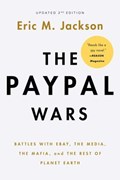Peter Thiel, Elon Musk, and the rest of the “PayPal Mafia” are now household names who’ve reshaped technology, automobiles, space travel, and politics. But two decades ago, they were unsung entrepreneurs attempting to launch a Silicon Valley startup against overwhelming odds.
That improbable journey started in the shadow of Stanford University, when Thiel met Max Levchin, a Ukrainian engineer who recently moved to California. Years before anyone had heard of Bitcoin, the two set out to build an online payment service that could reduce government control over currency by empowering people around the globe. But after their startup, PayPal, survived the dot-com crash only to find itself besieged by an unimaginable series of challenges, that lofty dream threatened to become a nightmare.
Former insider Eric M. Jackson’s telling of PayPal’s origins is an eyewitness account to technology history, as well as an engrossing story of human struggle and perseverance against overwhelming odds. PayPal went from unknown startup to online powerhouse in just three years, but for the company's team it was not an easy journey. The entrepreneurs that joined together to overhaul world currency markets first had to face one of the greatest series of trials ever thrown at a startup before becoming part of Silicon Valley lore.
Jackson's lively, blow-by-blow account of PayPal's death-defying beginnings and ferocious battles offers a detailed perspective that only an eyewitness could provide. Read The PayPal Wars and you'll learn how:
Turmoil pushed PayPal to the brink of insolvency before Thiel and his team turned the business around. “Our clashes with the credit card associations, the banking lobby, state regulators, foreign Mafioso, and litigation-happy lawyers significantly increased” as the company’s profile grew, writes Jackson, adding that the initial public offering that was meant to strengthen PayPal with an infusion of cash ironically attracted a rogue's gallery of foes instead.
"The modern business environment," Jackson concludes, "turned out to be more hostile than even our fiercest competitor." This somber warning—that regulators, lawyers, and lobbyists threaten to undermine American entrepreneurship—makes The PayPal Wars a timely read for every concerned citizen.

